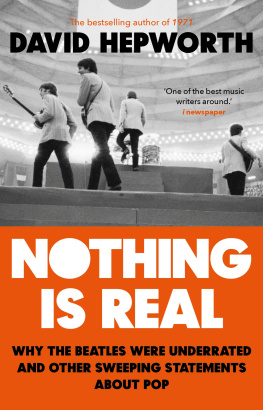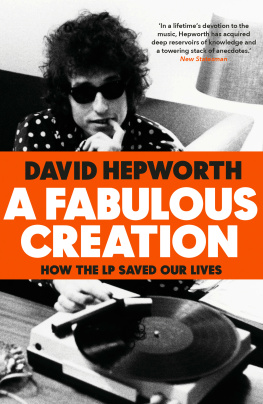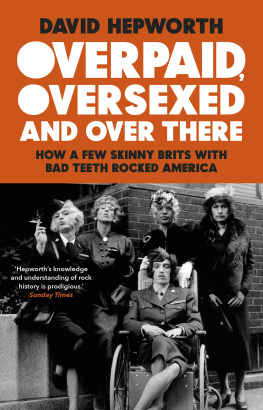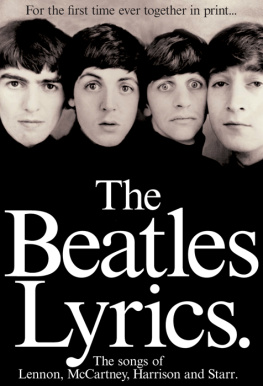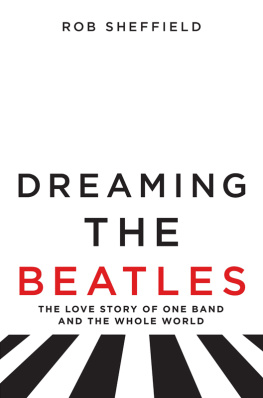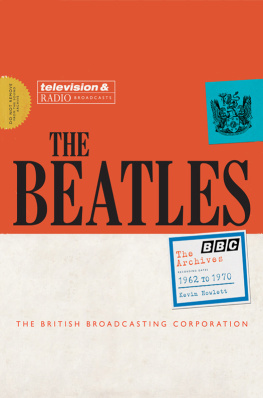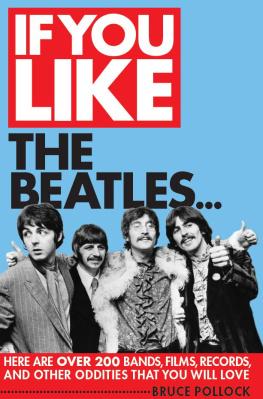ABOUT THE BOOK
Pop musics a simple pleasure. Is it catchy? Can you dance to it? Do you fancy the singer?
Whats fascinating about pop is our relationship with it. This relationship gets more complicated the longer it goes on. Its been going on now for fifty years.
David Hepworth is interested in the human side of pop. Hes interested in how people make the stuff and, more importantly, what it means to us.
In this wide-ranging collection of essays, he shows how it is possible to take music seriously and, at the same time, not drain the life out of it. With characteristic insight and humour, he explores the highways and byways of this vast multiverse where Nothing Is Real and yet it is, emphatically and intrinsically so. Along the way, he asks some essential questions about music and life: is it all about the drummer; are band managers misunderstood; and is it appropriate to play Angels at funerals?
As Pope John Paul II said, Of all the unimportant things, football is the most important. David Hepworth believes the same to be true of music, and this selection of his best writing, covering the music of the last fifty years, shows you precisely why.
CONTENTS
For Poppy and Alice
ACKNOWLEDGEMENTS
Thanks to Mark Ellen, who edited some of these pieces in their original form in The Word; and to Trevor Dann, who produced the series of Nothing Is Real essays, and Matthew Dodd, who commissioned them for BBC Radio 3.
Thanks also to my agent Charlie Viney of the Viney Shaw Agency, and Bill Scott-Kerr, Darcy Nicholson, Richard Shailer and Sally Wray of Transworld.
| website | www.davidhepworth.com |
| blog | whatsheonaboutnow.blogspot.co.uk |
| Twitter | @davidhepworth |
INTRODUCTION
WE CALLED HIM Uncle Stan. He wasnt really our uncle but thats what we called him. He would come and visit us at Christmas. Uncle Stan came from the other side of the Pennines, wore a cardigan with suede facings, worked as a salesman and was, by the standards of our house anyway, smooth. He smoked filter-tipped cigarettes, had his own smart hi-fi at home and believed that Frank Sinatra had said all there was to be said in popular music.
Uncle Stan singled me out because he liked to tease me about my gauche enthusiasm for music. At Christmas 1963 he visited as usual and said to me, as usual, What record have you got for Christmas this year? I proudly showed him my treasured copy of With The Beatles, which had come out a few weeks earlier. This was the Christmas of Beatlemania.
To the adults of the day Beatlemania seemed no more likely to be remembered in the future than the Christmas of the Mutant Ninja Turtles would seem to me when I had my own children to tease. Uncle Stan couldnt resist what seemed like an open goal. Let me tell you something, he said, reaching into the pocket of his Dean Martin cardigan for his Ronson lighter. When I come next year and I ask you the same question youll have forgotten all about the Beatles.
Of course Uncle Stan came the following year. And of course when I met him I was brandishing my new copy of Beatles For Sale. He returned in 1965 and I was able to greet him with Rubber Soul. At Christmas 1966 I brightly proffered my copy of Revolver.
By 1967 the poor man had given in and ruefully conceded that if only he had chosen to illustrate his point about the ephemeral nature of pop music with the example of the Dave Clark Five or Gerry and the Pacemakers he might have hit the bullseye. Instead through sheer ill luck he had landed on the act who were to the era of pop what Frank Sinatra had been to the era of the big bands the exception that proves the rule.
At the time even the idea of a career writing about pop music was a distant fantasy I didnt dare entertain. When it came to pass, in the mid-seventies when I was fulfilling my slightly less distant dream, that of working in a record shop, it was mainly exciting because it gave me access to the odd free album, which was the way I interpreted all questions of worldly wealth at the time. When that led eventually to a full-time job title containing the word editor I still didnt think it could last, any more than Ringo thought that his moment in the spotlight would last.
That was in 1979. Ive spent the almost forty years since then writing about, editing magazines about, broadcasting about and pontificating about pop music. Some of those pieces are reprinted here. In some cases Ive rewritten or added to them. Some were composed off the top of my head, as the best blog entries invariably are, while others were arrived at after prolonged chin-stroking, as befits essays to be broadcast by the most august wing of the BBC.
Quite a few of them touch upon the group that caused Uncle Stan such embarrassment back in the mid-sixties. Since then the Beatles have been the fixed point of my musical universe. I was one of the generation shaped by them. It wasnt just their music. It was the way they did everything. I can remember the thrill of first seeing them on TV. I can remember the pride I felt when they stormed the citadels of the adult world the London Palladium, Buckingham Palace, even the United States of America. I can remember the inevitability of their break-up. I can remember long periods in the seventies when nobody thought about them much. Then I remember the second Beatlemania that followed the death of John Lennon and their subsequent taking up by generations who werent born in that six-year window when they did the things they did.
With groups like the Beatles not that there are any groups like the Beatles theres a danger of the weight of their story distracting us from the piercing joy of their music. You could say something similar of someone like Frank Sinatra not that there was anyone like Frank Sinatra. In the case of both, the difference is all still in the records for those with ears to hear. Thats where this book begins. Half a century on from those Christmases with Uncle Stan the Beatles burn as brightly as ever.
London, 2018
THE LONG SHADOW OF THE FABS
THE BEATLES WERE UNDERRATED
IN THE COURSE of our forty-five-year love affair with the Beatles, something important was lost. Their craft became obscured by their artistry, their artistry disappeared into their significance and their significance was eventually folded inside their legend. The result is that they are underrated for the work they did and overrated, if anything, for what it all meant.
Louis Menands Iron Law of Stardom holds that no show-business career can be sustained for longer than three years. After that time creativity is exhausted and public affection begins to flag. Menand defends his theory against Beatles exceptionalists by pointing out that they actually had a six-year career divided into two: three years as cheery moptops immediately followed by three years as psychedelic adventurers.
Its this second period that tends to impress us most these days. Thats the one focused on by critics in the rock magazines or people of Noel Gallaghers generation. Its not a complete surprise. Theres a perceptible stylistic link between the White Album and, say, Paul Weller. This is immediately evident to the contemporary eye and ear. A few years ago an Oasis-loving friend of mine decided to buy a Beatles record to see what the fuss was about. He bought

